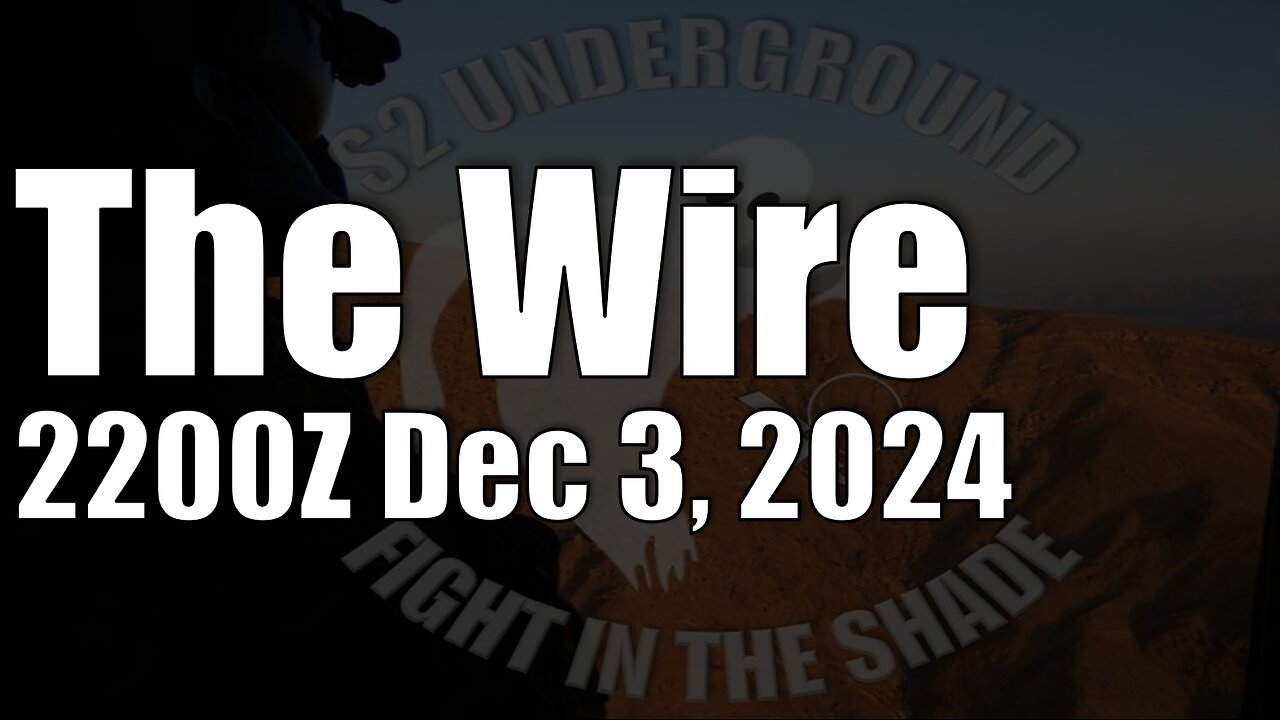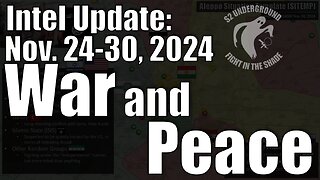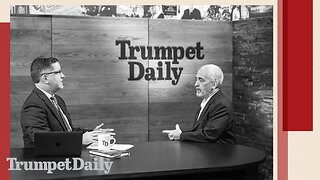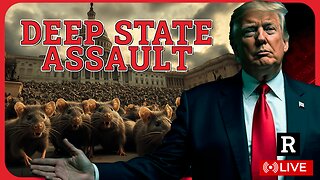Premium Only Content

The Wire - December 3, 2024
//The Wire//2200Z December 3, 2024//
//ROUTINE//
//BLUF: MARTIAL LAW DECLARED IN SOUTH KOREA, PRESIDENT DEPLOYS MILITARY THROUGHOUT SEOUL BEFORE PARLIAMENT NULLIFIES ORDER. SYRIAN REBEL FORCES CAPTURE ALEPPO, PIVOT SOUTH TOWARD HAMA.//
-----BEGIN TEARLINE-----
-International Events-
Syria: Opposition forces have completely taken the city of Aleppo, which largely remains under the control of opposition forces comprising of HTS, ISIS, and various other smaller al-Qaeda splinter groups. Syrian governmental forces largely have offered little resistance to the advance, which has continued to push south toward Hama. Fighting has now reached the suburbs of Hama, where the Syrian Army and Russia have mounted varying levels of defense.
Korean Peninsula: This morning President Yoon Suk-yeol declared martial law throughout South Korea and immediately ordered the suspension of Parliament and the deployment of military forces in Seoul. Immediately following this declaration, many events occurred in very short order. As military forces surrounded Parliament and entered the building with the goal of shutting down proceedings, legislators called an Emergency Session to conduct a snap vote to nullify the martial law declaration.
While Members of Parliament were climbing over barricades and using other means to gain access to the main voting hall of the National Assembly Building, soldiers encircled the building, with a large complement of military and police taking up position at the main entrance on the south side of the building. A detachment of unidentified soldiers (likely a Quick Reaction Force (QRF) from the RoK Army Special Warfare Command) were observed breaching the exterior windows of the Assembly Building to gain entry as at least 3x UH-60 helicopters established an aerial presence over the structure (possibly intending to conduct an Air Assault to fast-rope soldiers onto the roof of the building, but more likely to provide transportation for other QRF elements that deployed to the Assembly complex).
As armed soldiers were in the hallway outside the main chamber attempting to break through and/or bypass the barricades hastily constructed by Parliamentary staffers, the vote to nullify the martial law order passed unanimously, with 190 Members of Parliament who were able to vote supporting the reversal of the martial law declaration. Zero MPs voted to continue the state of martial law. Following the vote, the Speaker was able to convince the soldiers to depart from the building. A few minutes after the vote, military forces began withdrawing from the interior of the National Assembly Building, with most forces remaining in the vicinity while the details of command were being worked out.
Per South Korean law, the vote to nullify the state of marital law does not actually do so in practice, President Yoon is still required to issue the stand-down order himself. The vote in Parliament merely forces the President to issue the recension order. Consequently, Parliament announced that they will not leave the building until the order is rescinded by Yoon. Though the initial confrontations have simmered down, President Yoon has not been seen or heard from since the order was issued around midnight, and military spokesmen have indicated that they will not fully stand down without the order from Yoon himself. A few moments ago, rumors indicated that Yoon may issue the order to withdraw tomorrow.
However, several hours after the initial scuffle at the National Assembly Building, some reports suggested that military forces had indeed decided to follow their original orders as issued by President Yoon, which included arresting the leaders of Yoon’s opposition movement in Parliament: Lee Jae-myung, Han Dong-hoon, and Woo Won-sik. Earlier in the day, Lee Jae-myung had filmed himself stating that President Yoon was no longer President due to his actions. At the moment it is not clear as to if these opposition leaders were arrested by soldiers or police officers, but as this is a currently developing situation the very limited details that have been made public possibly indicate the former.
As of this report, a Korean standoff appears to be largely how the situation remains. Military forces remain deployed at the National Assembly Building and the surrounding area, in some form or fashion. President Yoon has not been directly seen or heard from since this incident started and police and/or military forces have arrested at least three members of his political opposition in Parliament. Following the high-tensions this morning, military forces are still involved to some degree, but do not appear to be hindering Parliamentary proceedings. Most members of Parliament remain inside the main hall of the National Assembly building. In short, all players are making phone calls and trying to figure out what to do next.
China: This morning tensions escalated once again as China announced an export ban on certain kinds of precious minerals and metals. Specifically, China has banned the export of Germanium, Gallium, Antimony, and other similar metals to the United States, due to the dual-use nature of these materials. AC: It’s too soon to tell how this will affect the United States manufacturing sector, but this move could prove to be catastrophic. For instance, some figures indicate that the United States imports roughly 95% of our Gallium from China. Similarly, Chinese mining and production accounts for roughly 59% of all Germanium, and roughly 48% of antimony on Earth. These metals are critical elements needed in the manufacture of everything from cellphones to nuclear warheads.
-HomeFront-
Washington D.C. – During President Biden’s state visit to Angola, he announced a $1 billion humanitarian aid package for Africa specifically to help those displaced from their homes due to weather disasters. AC: Considering the hundreds of American citizens that are displaced from their homes right now all around the country (but especially those currently living in tents as snow falls in western North Carolina), this announcement has largely been interpreted as an accurate representation of the priority that is placed on disaster management within the United States.
-----END TEARLINE-----
Analyst Comments: The reasoning for the exceptionally serious developments in South Korea are up for debate. President Yoon has claimed that Communist forces have infiltrated politics, thus requiring martial law to crack down on and root out from within political institutions. However, other details paint a different picture as the crackdown is largely taking place among his political opponents who were trying to organize impeachment proceedings against him in Parliament. Now, from the outside looking in, it seems like the President has declared martial law to use the military against his political opponents. Whether this remains true or not is uncertain, but the implementation of martial law anywhere is quite hard to justify especially since President Yoon has not elaborated on exactly why he felt the need to declare Martial Law. Beyond the very short emergency address provided overnight, no specifics have been provided regarding exactly what objective the declaration was intended to reach.
Whatever the case may be, what is quite certain is that South Korea very narrowly avoided disaster earlier today, but the nation still might not be out of the woods just yet. This is most clearly demonstrated by the command and control of military forces throughout Seoul; no one is really certain as to who is actually in charge. Military forces have been observed following Yoon’s orders at first before being talked out of shutting down Parliament by the Speaker, only to end up arresting Yoon’s opposition anyway. Of course, these details all depend on the exact military orders themselves, and whether or not active duty soldiers have participated in the arrests of politicians in Parliament, or if the military has washed their hands of the whole thing. In a grander sense, the minute (but important) details of how arrests have been carried out may be a moot point by the end of the day; arresting elected officials and dragging them out of their offices in the Assembly building is not a good look for any political leader, especially one which was potentially facing a properly and legally organized impeachment effort coordinated by these same representatives.
More broadly, it is always interesting how age-old conflicts which have been host to a relative state of peace for many years, suddenly re-erupt into conflict once again anytime a significant transfer of power occurs in the United States. Though correlation rarely proves anything on its own and tensions on the Korean Peninsula have been simmering for years, the invisible hands of the United States, China, and Russia to prop up their prospective proxies can certainly be noticed by anyone. A little over 6 years ago, North Korean leader Kim Jong Un took his first steps into South Korea alongside President Donald Trump. In only six years, the trend toward cooling relations has radically reversed, with Kim Jong Un completely reversing course on any sort of reconciliation with the South, or at least a more peaceful peace. In just six years, Kim Jong Un changed course, completely removing all references to a reunited Korea, even to include explosively destroying one of North Korea’s most famous monuments, the Arch of Reunification. Now, seemingly out of the blue, trouble has arrived south of the border with South Korean domestic politics reaching levels of instability that haven’t been this serious since the 1980’s. The question of “why now?” remains a relevant one, albeit largely unanswerable with any certainty at this point. Of course, today’s events in Korea are vastly more complicated than a simple power grab. The economy, social demographic changes, and complex sentiments of national unity all are major factors at play.
Is President Yoon (a somewhat hardline conservative) correct in his assessment that Communist forces have indeed subverted his nation’s political systems? Or is this a desperate bid by an unpopular President to retain power? Neither question has a clear answer, however the larger question that should be asked is: who stands to gain from tensions on the Korean Peninsula increasing and the division between the North and South widening further? Considering that the United States has a substantial military presence in South Korea, to include direct partnerships and shared military command with the same units that likely took part in today’s activities, these are pertinent questions that remain unanswered.
Similar sentiments are on display in Syria. Why now, after years of stagnation, have relatively minor opposition forces suddenly found the will to conduct what might end up being the most substantial advance of the entire Syrian War? Again, only time will tell. And even then, the answers probably won’t be clear in any case.
Analyst: S2A1
//END REPORT//
-
 37:34
37:34
S2 Underground
10 days agoIntel Update - November 30 - War and Peace
1.73K4 -
 1:06:50
1:06:50
Dr. Drew
9 hours agoRoger Ver, Jan 6ers, Ross Ulbricht: Who Should Trump Pardon First? w/ Robert Barnes & Aaron Day – Ask Dr. Drew
21.6K3 -
 11:56
11:56
Tundra Tactical
2 hours ago $0.24 earnedWas the UnitedHealthcare CEO Assassination a PSYOP?
1.43K1 -
 52:46
52:46
Sarah Westall
2 hours agoPower of Nocebo and Placebo in Health & Politics. Quantum Energy Advancements w/ Ian and Philipp
6.64K3 -
 54:59
54:59
LFA TV
23 hours agoLee Smith Discusses ‘Disappearing the President’ | Trumpet Daily 12.11.24 7PM EST
6.64K -
 LIVE
LIVE
2 MIKES LIVE
4 hours ago2 MIKES LIVE #154 w/ Spcieal Guests, BRIANNE DRESSEN, DAN SMERIGLIO and ADAM DERITO!
151 watching -
 1:28:46
1:28:46
Redacted News
5 hours agoBREAKING! CIA DEEP STATE PLAN TO STOP TRUMP ACCELERATES WITH FALSE FLAGS TIED TO IRAN | REDACTED
142K285 -
 5:38:59
5:38:59
Dr Disrespect
9 hours ago🔴LIVE - DR DISRESPECT - FORTNITE - FIRST PERSON MODE
208K70 -
 1:01:25
1:01:25
Exploring With Nug
10 hours ago $1.21 earnedMissing Person Found After 25 Years With A Dark Past! What Did He Do?
18.4K1 -
 1:02:09
1:02:09
In The Litter Box w/ Jewels & Catturd
1 day agoFANI IN DEFAULT | In the Litter Box w/ Jewels & Catturd – Ep. 703 – 12/11/2024
75.3K23